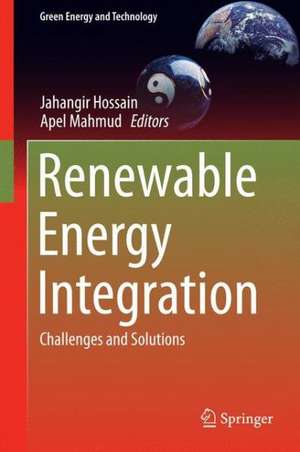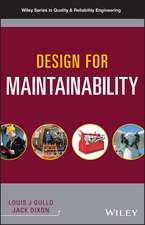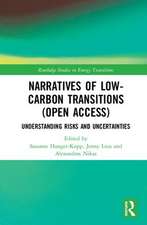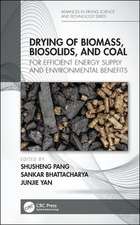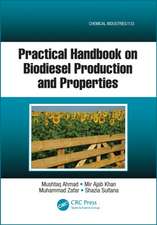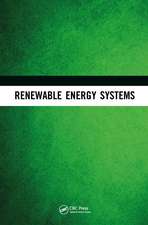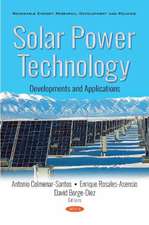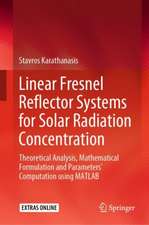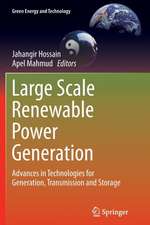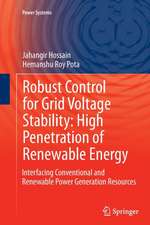Renewable Energy Integration: Challenges and Solutions: Green Energy and Technology
Editat de Jahangir Hossain, Apel Mahmuden Limba Engleză Hardback – 14 feb 2014
| Toate formatele și edițiile | Preț | Express |
|---|---|---|
| Paperback (1) | 952.26 lei 43-57 zile | |
| Springer Nature Singapore – 18 sep 2016 | 952.26 lei 43-57 zile | |
| Hardback (1) | 958.38 lei 43-57 zile | |
| Springer Nature Singapore – 14 feb 2014 | 958.38 lei 43-57 zile |
Din seria Green Energy and Technology
- 18%
 Preț: 943.43 lei
Preț: 943.43 lei - 20%
 Preț: 629.52 lei
Preț: 629.52 lei - 18%
 Preț: 1124.92 lei
Preț: 1124.92 lei - 18%
 Preț: 947.35 lei
Preț: 947.35 lei - 15%
 Preț: 655.92 lei
Preț: 655.92 lei - 18%
 Preț: 957.62 lei
Preț: 957.62 lei - 18%
 Preț: 789.52 lei
Preț: 789.52 lei - 17%
 Preț: 464.55 lei
Preț: 464.55 lei - 15%
 Preț: 645.79 lei
Preț: 645.79 lei - 18%
 Preț: 903.93 lei
Preț: 903.93 lei - 24%
 Preț: 1322.07 lei
Preț: 1322.07 lei - 18%
 Preț: 890.54 lei
Preț: 890.54 lei - 18%
 Preț: 1115.46 lei
Preț: 1115.46 lei - 18%
 Preț: 1117.03 lei
Preț: 1117.03 lei - 18%
 Preț: 949.73 lei
Preț: 949.73 lei - 18%
 Preț: 892.11 lei
Preț: 892.11 lei - 15%
 Preț: 648.24 lei
Preț: 648.24 lei - 18%
 Preț: 997.09 lei
Preț: 997.09 lei - 15%
 Preț: 579.81 lei
Preț: 579.81 lei - 18%
 Preț: 1123.15 lei
Preț: 1123.15 lei - 18%
 Preț: 961.41 lei
Preț: 961.41 lei - 17%
 Preț: 490.22 lei
Preț: 490.22 lei - 18%
 Preț: 904.60 lei
Preț: 904.60 lei - 15%
 Preț: 643.34 lei
Preț: 643.34 lei -
 Preț: 287.90 lei
Preț: 287.90 lei - 24%
 Preț: 634.04 lei
Preț: 634.04 lei -
 Preț: 379.39 lei
Preț: 379.39 lei - 18%
 Preț: 783.20 lei
Preț: 783.20 lei - 18%
 Preț: 1394.84 lei
Preț: 1394.84 lei - 18%
 Preț: 1691.57 lei
Preț: 1691.57 lei - 18%
 Preț: 1112.48 lei
Preț: 1112.48 lei - 15%
 Preț: 592.61 lei
Preț: 592.61 lei - 18%
 Preț: 952.09 lei
Preț: 952.09 lei - 18%
 Preț: 944.19 lei
Preț: 944.19 lei - 18%
 Preț: 891.33 lei
Preț: 891.33 lei - 18%
 Preț: 1252.44 lei
Preț: 1252.44 lei - 18%
 Preț: 789.52 lei
Preț: 789.52 lei - 20%
 Preț: 566.29 lei
Preț: 566.29 lei - 18%
 Preț: 1113.71 lei
Preț: 1113.71 lei - 18%
 Preț: 1114.24 lei
Preț: 1114.24 lei - 24%
 Preț: 590.58 lei
Preț: 590.58 lei - 20%
 Preț: 567.49 lei
Preț: 567.49 lei - 24%
 Preț: 907.48 lei
Preț: 907.48 lei - 18%
 Preț: 952.89 lei
Preț: 952.89 lei - 18%
 Preț: 952.89 lei
Preț: 952.89 lei - 18%
 Preț: 950.52 lei
Preț: 950.52 lei
Preț: 958.38 lei
Preț vechi: 1168.76 lei
-18% Nou
Puncte Express: 1438
Preț estimativ în valută:
183.39€ • 191.95$ • 152.64£
183.39€ • 191.95$ • 152.64£
Carte tipărită la comandă
Livrare economică 31 martie-14 aprilie
Preluare comenzi: 021 569.72.76
Specificații
ISBN-13: 9789814585262
ISBN-10: 9814585262
Pagini: 360
Ilustrații: X, 447 p. 264 illus., 126 illus. in color.
Dimensiuni: 155 x 235 x 32 mm
Greutate: 0.82 kg
Ediția:2014
Editura: Springer Nature Singapore
Colecția Springer
Seria Green Energy and Technology
Locul publicării:Singapore, Singapore
ISBN-10: 9814585262
Pagini: 360
Ilustrații: X, 447 p. 264 illus., 126 illus. in color.
Dimensiuni: 155 x 235 x 32 mm
Greutate: 0.82 kg
Ediția:2014
Editura: Springer Nature Singapore
Colecția Springer
Seria Green Energy and Technology
Locul publicării:Singapore, Singapore
Public țintă
ResearchCuprins
Green Energy and Technology: Choosing Among Alternatives.- Grid Codes: Goals and Challenges.- Fault-Ride Through criteria development.- High Penetration of Rooftop Photovoltaic Cells in Low Voltage Distribution Networks: Voltage Imbalance and Improvement.- Performance Evaluation of Grid-Connected Solar Photovoltaic (SPV) System with Different MPPT Controllers.- Optimal Siting and Sizing of Wind Turbines based on Genetic Algorithm and Optimal Power Flow.- Power Flow Analysis and Reactive Power Compensation of Grid Connected Wind Energy Conversion Systems.- Contribution of Variable-Speed Wind Generators to Frequency Regulation and Oscillation Damping in the United States Eastern Interconnection (EI).- Power Management of Low or Medium Voltage Networks with High Density of Renewable Generation.- Integration of Green Energy into Power Distribution Systems – Study of Impacts and Development of Control Methodology.- Integrating Smart PHEVs in Future Smart Grid.- Coordinating DistributedEnergy Sources during Microgrid Emergency Operation.- A Novel Aggregation Technique using Mechanical Torque Compensating Factors for DFIG Wind Farms.- DC Grid Interconnection for Conversion Losses and Cost Optimization.- Interconnected Autonomous Microgrids in Smart Grids with Self-Healing capability.- Agent-based Smart Grid Protection and Security.- Vulnerabilities of Smart Grid State Estimation against False Data Injection Attack.- Impediments and Model for Network Centrality Analysis of a Renewable Integrated Electricity Grid.
Notă biografică
Dr. Jahangir Hossain received his Ph.D. in Electrical and Electronics Engineering from the University of New South Wales, Australia. He is currently a lecturer in the Griffith School of Engineering, Griffith University, Gold Coast, Australia. Before joining Griffith University, he served as a research fellow in the School of Information Technology and Electrical Engineering, University of Queensland, Australia. His research interests are power systems, renewable energy integration and stabilization, voltage stability, micro grids, robust control, electrical machine, FACTS devices and energy storage systems.
Dr. Apel Mahmud received his PhD degree in Electrical Engineering from the University of New South Wales, Australia. He is currently a lecturer at Swinburne University of Technology, Australia. His research interests are dynamic stability of power systems, renewable energy integration, smart grids, nonlinear control theory and electrical machines.
Dr. Apel Mahmud received his PhD degree in Electrical Engineering from the University of New South Wales, Australia. He is currently a lecturer at Swinburne University of Technology, Australia. His research interests are dynamic stability of power systems, renewable energy integration, smart grids, nonlinear control theory and electrical machines.
Textul de pe ultima copertă
This book presents different aspects of renewable energy integration, from the latest developments in renewable energy technologies to the currently growing smart grids. The importance of different renewable energy sources is discussed, in order to identify the advantages and challenges for each technology. The rules of connecting the renewable energy sources have also been covered along with practical examples. Since solar and wind energy are the most popular forms of renewable energy sources, this book provides the challenges of integrating these renewable generators along with some innovative solutions. As the complexity of power system operation has been raised due to the renewable energy integration, this book also includes some analysis to investigate the characteristics of power systems in a smarter way. This book is intended for those working in the area of renewable energy integration in distribution networks.
Caracteristici
Provides models of power systems necessary to understand its impacts on conventional power grids and various solutions to minimize the impacts Highlights the integration of renewable energy into the existing electricity grid Puts renewable energy integration in perspective by comparing the change in the system dynamics as compared to the traditional electricity grid Includes supplementary material: sn.pub/extras
